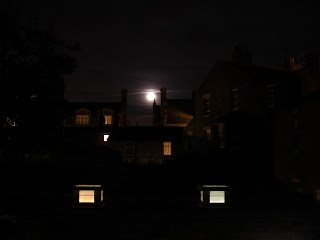Falling in love again, love again . . .
 A comment was left on my last blog that caused me to articulate a few things that I'd like to pull up and out into an individual post. Thanks to Gerrit (and indeed everyone who drops by and starts a conversation) for the questions.
A comment was left on my last blog that caused me to articulate a few things that I'd like to pull up and out into an individual post. Thanks to Gerrit (and indeed everyone who drops by and starts a conversation) for the questions.Gerrit began by noting that he didn't t understand how I got from "show, don't say" to "we should eat organic fruit." I can see how some folk might think I was making that point - my weak skills of presentation are to blame I think - but I wasn't. It is possible that as a consequence of following the course that I (and Freya Mathews) suggests that a person will end up eating organic fruit but that is not necessarily the case. My basic point is simply that humanity seems pathologically unable to be satisfied with the given and endless seek to modify it according to a process that treats Nature as an object rather than a subject. In other words the encounter with Nature is monological not dialogical - we rarely let her 'speak' to us. (On the matter of nature 'speaking' to us I touch upon this in my most recent address which I'll post later this week.
Gerrit then askes "isn't the hitchhiker in the car like a person born into a system where pears are grown on massive farms?" Yes, I think this is quite right. That pears are grown this way is a given. We have to be hitching rides with this fact (and dialoging with it) as much as any other and then see where we end up. The end result may not be organic pears at all. To reiterate - I'm concerned that we simply start treating Nature as an 'other.' I have taken to rephrasing Jesus' call to love God and love neighbour to a call to love God and Nature as ourselves.
Gerrit's next point about separating "our preconceived notions from what is apparently actually there" and that "we can't really draw conclusions like we usually do" is, I think, pretty much spot on. That doesn't mean that we cannot continue to draw those "conclusions" but we have to see then as far from concluding anything (and so shouldn't really be called conclusions) but as a snapshot of a sentence made by one party during a much longer and wide ranging conversation. As the well known aphorism puts it: unquestioned answers are far more dangerous than unanswered questions.
Gerrit's last point, that maybe, the fly gets out of the bottle and says, "now what?" and the answer very well might be, "You know, whatever" is, I think, very important indeed. If folk who read this do end up thinking "Whatever" then I will have failed absolutely. What I am hoping is that when people get out of the fly bottle and start to encounter Nature as she presents herself to them (on the dance-floor of existence - i.e. this world) their response will be utter wonder at how extraordinary and beautiful she is and that this wonder will cause that person (and slowly our culture) to fall back in love with her. As a vital concluding note remember I follow Spinoza in thinking God is Nature and Nature is God (Deus sive Natura) so to love Nature is to love God. To the subject of my love I can never say "whatever" but only "will you dance" and, later in the evening, to whisper quietly in her ear "thank-you" and "I love you."


Comments